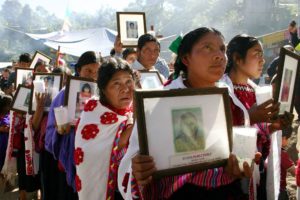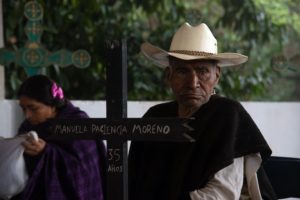 Chenalho, Mexico, Mar 6 (EFE).- The families and survivors of the massacre of 45 indigenous people which took place on Dec. 22, 1997 in Acteal, in the Mexican state of Chiapas, demanded on Wednesday that the Inter-American Commission on Human Rights (IACHR) produce a report to determine whether or not human rights were violated.
Chenalho, Mexico, Mar 6 (EFE).- The families and survivors of the massacre of 45 indigenous people which took place on Dec. 22, 1997 in Acteal, in the Mexican state of Chiapas, demanded on Wednesday that the Inter-American Commission on Human Rights (IACHR) produce a report to determine whether or not human rights were violated.
By publicly expressing their decision to follow this procedure in the case of the Acteal massacre before the IACHR, which admitted the case eight years and four months ago, they reiterated their rejection of the offer for an amicable solution proposed by the Mexican State.
In a press conference in Chenalho, Chiapas, on Wednesday the families of the victims and survivors, supported by the Civil Society Organization Las Abejas (The Bees) de Acteal, expressed their rejection of the offer of a friendly solution.
They pointed out that with the “in-depth report” they are demanding from the IACHR, “the Mexican State will have to respond to us for all the damage it has done to us,” they added.
In the eight years and four months since the IACHR received the case, sufficient evidence has been presented to point to the Mexican State as responsible for the Acteal massacre, they said.
Survivor Guadalupe Vazquez Luna, who lost nine family members in the massacre, said the massacre affected her deeply because half of her family, including her parents and siblings, were taken from her.
“We ask for an in-depth investigation and we want to reaffirm that we don’t want a friendly solution, we want the case to go to the bottom,” she said.
Vazquez Luna recalled that on Oct. 20, 2015, at the 156th session of the IACHR, families and survivors have already expressed their rejection of the offer of a friendly solution proposed by the Mexican state.
 “That friendly solution does not revive the dead, it does not erase the pain, it does not console our tears, it cannot cover the blood spilled here in Acteal,” Vazquez Luna told Efe.
“That friendly solution does not revive the dead, it does not erase the pain, it does not console our tears, it cannot cover the blood spilled here in Acteal,” Vazquez Luna told Efe.
The Las Abejas organization indicated that they have no “illusions” about the new Mexican government headed by President Andres Manuel Lopez Obrador, although “it has generated expectations that it will be a government for the poor.”
“We know that true justice will not come from up there (the state), which is why we are making this statement today,” the organization said.
Survivor Juan Vazquez, president of Las Abejas de Acteal, assured that 21 years after the Acteal massacre, the pain is still felt, and the massacre will never be forgotten.
“The pain is very great, it is like going back to live the massacre, because just in this place down here was the massacre and here the 45 are buried, our parents, siblings, grandparents and siblings,” he said.
For the members of Las Abejas de Acteal, he said, this case causes tremendous sadness because it seems that the survivors and the families of the victims “are being punished for the injustice, it seems that the criminals, the murderers, are rewarded with houses and land, and they are not imprisoned”.
On December 22, 1997, 45 Tzotzil Indians, mostly women and children members of Las Abejas, were murdered during a prayer meeting in Acteal, in the municipality of Chenalho, Chiapas state, by paramilitaries allegedly linked to the Institutional Revolutionary Party (PRI), who were then in power.
Las Abejas is an organization created in 1992 in defense of the rights of communities that advocated for the peaceful resolution of local conflicts and the release of people unjustly imprisoned.
After the uprising of the Zapatista Army of National Liberation (EZLN) on Jan. 1, 1994 in Chiapas, the group showed solidarity with its objectives, but rejected the use of violence to achieve them.
The Acteal massacre has been attributed to a government campaign against the EZLN bases of support.
In recent years, the more than 30 alleged perpetrators arrested and prosecuted for the massacre have been released by a ruling of the Supreme Court of Justice of the Nation (SCJN) issued in 2009.
